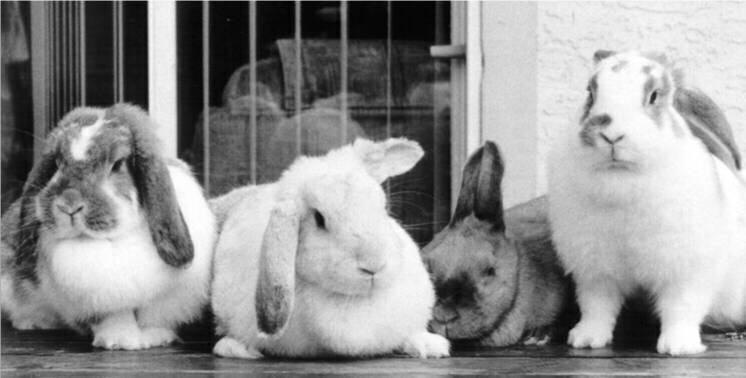Considerations before getting a rabbit

A house rabbit is a great joy but one has to be very dedicated, conscientious, and knowledgeable. Given the proper care a rabbit can live up to twelve years. They are naturally very sociable, curious, and active. Kept in a cage or hutch is unnatural, cruel, and lonely. This is not a life.
Think it through very carefully.
l) A rabbit is not a toy and needs the freedom to freely move about. Cleaning the living area, washing dishes, litter pans etc. are part of the daily routine.
2) A rabbit needs to be litter trained, but this is not always successful. Accidents may occur so keep this in mind.
3) Finances must be available to provide visits to the veterinarian, if necessary. Good quality food will help keep your rabbit healthy. Not all vets are familiar with rabbits so check around. Plan ahead for vacations to ensure your pet will be taken care of.
4) If there are other pets in the household an adjustment will have to be made so the rabbit can fit in.
5) Everybody in the family must want the rabbit and one must ensure that nobody has allergies. They are not "starter pets" for children.
6) The house should be rabbit proofed since they like to chew on wood and electrical cords. They may also pull at the carpet.
7) Have your rabbit spayed or neutered. There is an overabundance of unwanted rabbits at shelters or pounds, and others that have simply been discarded to the outdoors. A female can become pregnant at any time except three or four days of the month. Spaying helps prevent uterine cancer in the females. Neutering the male is an easier operation. Once altered they become a little calmer and the incidents of spraying become less frequent. Again, check to make sure that your veterinarian is experienced with rabbits.
 Before
bringing the rabbit home make sure everything is ready. They require water, a
commercial pellet mix, and good quality hay, such as timothy. The hay helps
prevent fur balls. Carrot tops, apples, parsley, and dandelion greens are among
other foods that they enjoy. Nothing should be given straight from the
refrigerator. Wash the foods with lukewarm water before feeding your bunny.
Before
bringing the rabbit home make sure everything is ready. They require water, a
commercial pellet mix, and good quality hay, such as timothy. The hay helps
prevent fur balls. Carrot tops, apples, parsley, and dandelion greens are among
other foods that they enjoy. Nothing should be given straight from the
refrigerator. Wash the foods with lukewarm water before feeding your bunny.
 Dwarf rabbits
are naturally resistant and robust if the overall living conditions are good and
they receive proper care. Their living quarters must be clean, dry, and away
from drafts. Always be mindful of any change in the bunnies' behavior or
appearance. Healthy rabbits are frisky, inquisitive, have bright eyes, and good
coats.
Dwarf rabbits
are naturally resistant and robust if the overall living conditions are good and
they receive proper care. Their living quarters must be clean, dry, and away
from drafts. Always be mindful of any change in the bunnies' behavior or
appearance. Healthy rabbits are frisky, inquisitive, have bright eyes, and good
coats.
Animals are not possessions or property and treating them as such is unethical and unfair. We domesticated rabbits and if we want to bring one into our home, respect, care, love, and understanding are essential. Remember that rabbits are sentient beings. Unfortunately, too many animals are abandoned, neglected, and abused. Please be absolutely sure that when adopting a pet that you are prepared to give it the quality of life it deserves.
A good
source of information is the
House Rabbit Society. 
Shelters, rescue groups, and pounds are overflowing with unwanted rabbits. Save a life; give them a second chance.
Carmina Gooch, rabbit rescuer and advocate
See our Rabbit Issues page for more
Visit our Rescue/In Memory/Facts page